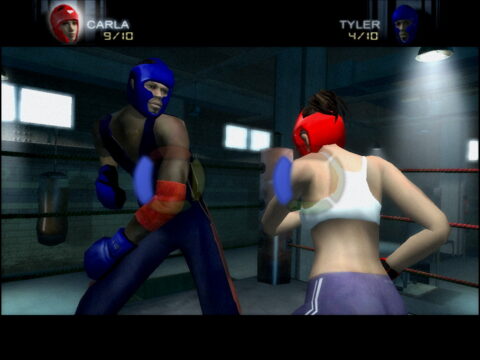
Fahrenheit
Written by: Rik
Date posted: August 7, 2018
- Genre: Adventure
- Developed by: Quantic Dream
- Published by: Atari
- Year released: 2005
- Our score: 8
Fahrenheit opens with scenes of a grisly murder. One man is innocently taking a whizz at the urinals of a New York diner; another emerges from a nearby cubicle, fresh from carving some symbols into his own arms, and stabs him to death. Quick as a flash, it is revealed that you are Mr Toilet Murder Man. You haven’t any idea why you’ve just done what you’ve done, but you have to work out what to do next. There’s a body, there’s blood, and there’s a cop outside who has had a coffee or two and will need to relieve himself shortly. Compose yourself sufficiently to clean up and make an escape, and during the next chapter, control will switch to the investigating detectives, who’ll examine the scene for evidence – what you (and they) find will be dependent on your actions as the murderer.
That sets the tone: Fahrenheit (released in the US as Indigo Prophecy) is an adventure game in which choices need to be made urgently, with seemingly grave consequences for making bad ones. Puzzles are few, you have no inventory, and there’s very little time to be spent wandering around not knowing what to do next, entering into circular conversations and trying to use object x on object y. Most of the time, things will be happening to you, and it’s about how you react to and navigate through those situations. You must perform actions or dialogue choices under time pressure, and participate in extended action sequences at various points.
Action throughout switches between the three protagonists: the bemused killer, Lucas Kane, and the two detectives, Lieutenant Carla Valenti and Sergeant Tyler Miles. Playing both pursuer and pursuee is a relatively novel approach, although I don’t think it’s giving too much away to say that, given you’re in control of all three throughout the game, their paths rarely cross directly. The two cops often have to work together, or at least, you have to use them both, switching between them on the fly when necessary. (For example, in that early investigation scene, Tyler can find clues that Carla can’t, and vice-versa).
Heresy it may be to the adventure game purist, but in Fahrenheit it’s perfectly acceptable, nay preferable, to use a joypad, as much of the game relies on the use of dual analogue sticks. The left one will move your character around; the right is used to interact with the game world, from relatively straightforward actions like starting a conversation or opening a door, achieved with a simple push in a particular direction, to more complex manoeuvres like climbing a fence, which require a more circuitous motion. During dialogue, the right stick is also used to choose topics. Action sequences usually either require some frantic mashing of the shoulder buttons or successfully repeating a series of direction presses on the sticks as indicated to you on screen. During these so-called Quick Time Events (QTEs) you’re not actually in direct control of your character, you just need to hammer hard enough or repeat the pattern in order to succeed.
If you fail, you lose a life (in a rare reversion to video game norms) and try again. While adventuring, however, unless you make a crucial game-ending mistake, your choices will either positively or negatively affect your mental health levels, complete deterioration of which can also lead to game over. These actions may either be story-related (during the murder clean-up, for example) or incidental (taking a shower before going to work, or repeatedly drinking gin at every opportunity). In the case of the latter, in particular, there’s plenty of variety if you explore and experiment – although idly doing anything and everything, as you might in a traditional point and click adventure, isn’t necessarily the way to go about things – but when it comes to the overarching story, there will be certain events that need to take place for plot reasons and there will be an effect on your mental health regardless of your actions.
Fahrenheit‘s approach is certainly a contrast to Quantic Dream’s previous title, Omikron: The Nomad Soul – a game that I possibly didn’t play for long enough to produce a thorough write-up, although the time invested was sufficient to determine that I didn’t really like it. From what I remember, there was almost too much freedom to walk around the silly sci-fi world having boring and repetitive conversations with its inhabitants, without much sense of purpose or really knowing what to do next. Here, everything is rather more immediate.
Also, the sense of European eccentricity that permeated Omikron has given way to more brazenly Hollywood aspirations, with Fahrenheit presented like a movie at times (the slightly bizarre tutorial featuring creator David Cage shows him wandering around a set, as if Fahrenheit was a film and he the director). Unfortunately, it doesn’t quite deliver on this front: at no point does it feel like the action is taking place in the US, the dialogue is clunky, and you could probably run a whole media studies module on the problems with how the main characters are presented.
Having said that, it’s pretty hard not to be drawn in, if only by the urgency and unpredictability of events. It’s probably best if you pretend it all takes place is a generic city, possibly one where all the inhabitants speak as if translating into English as they go. Accept that it’s not going to be the Hollywood thriller it sets out to be, in other words, and it’ll be fine. Admittedly, even with such caveats in place, things do go very wonky at the end of the story, but by that point it’s likely you’ll have committed to going with it regardless. It should also be said that one area in which Fahrenheit does feel movie-like is the soundtrack, with long-time David Lynch collaborator Angelo Badalamenti contributing original music, and a variety of other licensed songs (albeit with a heavy reliance on the dubious qualities of Canadian rockers Theory of a Deadman) also cropping up at regular intervals.
When you break it all down, you’re not actually doing that much in Fahrenheit, but at the time, it feels like you are. Choices seem important, and the QTEs do transfer a sense of panic and physical exertion to the action bits that might otherwise be lacking. At times, the twin stick pattern-repeat sections do seem to be overused, e.g. for story-based sequences where you really could do with focusing on what’s going on rather than watching the middle of the screen like a hawk. The main complaint about the third person adventure segments would be the slightly iffy camera and controls: camera changes come at odd moments and cause you to become disorientated too easily. There are also a couple of stealth sections, flashbacks to Lucas’s childhood, which can be quite annoying until you figure out the one way to beat each one (see Don’t move or I’ll shoot for the way through one particularly irritating example). Not only do these sections jar with what you’re doing in the rest of the game, they don’t seem particularly pertinent to the story (although the significance of Lucas’s childhood does eventually become apparent, albeit in a manner consistent with the generally unconvincing finale).
Either during the game or after your first playthrough, the temptation to go back and do things differently will be significant. Unfortunately, at that point it becomes clear that you can’t really affect key events all that much. Expectations of a completely free “choose your own adventure” would be unrealistic, and there are lots of little things you can do or say that do make some differences later on, but many of the seemingly crucial moments aren’t as crucial as it appears. Also, many of the alternative scenes are associated with foolish actions or failure, which gamers are naturally hard-wired to avoid. Still, it’s fairly short and progress should be relatively straightforward, so a second run shouldn’t be too onerous. If you prefer to tinker with things as you go, you can go back to each completed chapter at any point and save your new choices under a different profile. (Fahrenheit uses a checkpoint/auto-save system, although the chapters are all brief enough and it’s rare that you’re sent back too far).
Fahrenheit creator David Cage was a divisive figure even before stories of a toxic working environment at Quantic Dream came to light, due in part to some of the things we’ve already mentioned – the lack of true interactivity and choice, and the juxtaposition of movie-like ambition and clumsy dialogue and storytelling, issues that apparently have afflicted subsequent Quantic Dream titles such as Heavy Rain and Beyond: Two Souls.
There’s a perception perhaps that his games don’t do what he specifically states that he wants them to do, and that’s certainly something that could be levelled at Fahrenheit, based on the earnest, and mildly incomprehensible, introduction from Cage in the manual. Bemoaning the supposed action focus of so many games, he proffers Fahrenheit as a true break with convention: “My contribution to the transformation of video games into a true form of expression that conveys emotion. The solutions I offer are not the only ones, but Fahrenheit’s huge merit is that it asks real questions and offers concrete answers. It shows how it’s possible…to tell a story and play a game without sacrificing either the interactivity or the narrative.”
It’s fair to say that Fahrenheit doesn’t succeed in matching such lofty ambitions. However, his statement concludes: “I will consider myself fortunate if, like the books, films, and songs that have made lasting impressions on you, Fahrenheit could leave some small trace too.” Judged by these more modest criteria, it is a success: a novel and engaging adventure that does leave a mark on the player.
Arguably, it also left a mark on the genre: you can certainly see Fahrenheit‘s influences on later action-adventure games like Mass Effect or Alpha Protocol (with the latter’s time-sensitive dialogue choices, in particular, seeming to owe something to this game), or Telltale’s decision-heavy adventures such as The Walking Dead.
So, while there are lots of things wrong with it, and it may not be everyone’s cup of tea, I did like Fahrenheit, and recommend it both as an enjoyable experience and as an important piece of modern adventure game history.

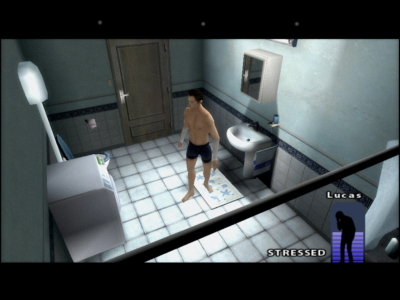
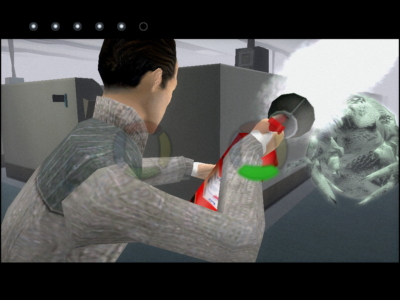
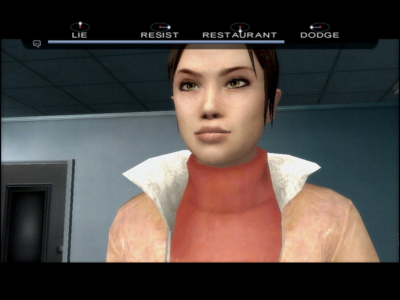
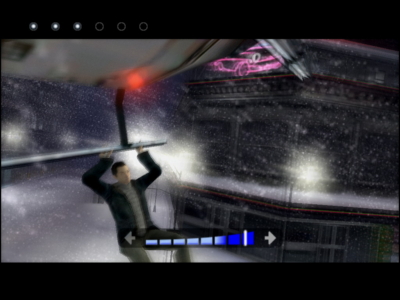
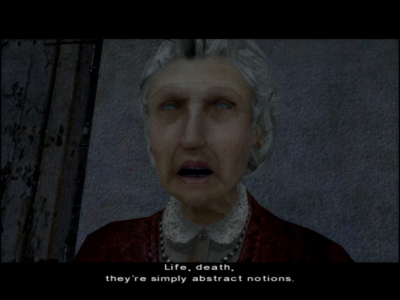

 Posts
Posts